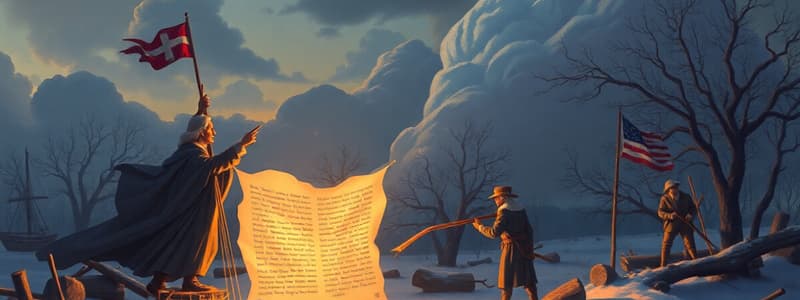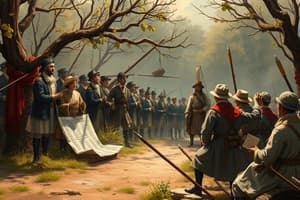Podcast
Questions and Answers
Who was tasked with drafting the Declaration of Independence?
Who was tasked with drafting the Declaration of Independence?
- Benjamin Franklin
- Thomas Jefferson (correct)
- John Adams
- George Washington
Jefferson believed that the authority of a government comes from God.
Jefferson believed that the authority of a government comes from God.
False (B)
What rights did Jefferson claim everyone is entitled to?
What rights did Jefferson claim everyone is entitled to?
Life, Liberty, and the pursuit of Happiness
The phrase 'We hold these truths to be self-evident, that all men are created equal' is part of the _____.
The phrase 'We hold these truths to be self-evident, that all men are created equal' is part of the _____.
Match the following concepts with their meanings:
Match the following concepts with their meanings:
What did Jefferson think should happen if a government fails to protect people's rights?
What did Jefferson think should happen if a government fails to protect people's rights?
According to Jefferson, what had King George shown towards the rights of colonists?
According to Jefferson, what had King George shown towards the rights of colonists?
What was the main purpose of the Olive Branch Petition?
What was the main purpose of the Olive Branch Petition?
The majority of colonists were eager and ready to declare independence from Britain in 1775.
The majority of colonists were eager and ready to declare independence from Britain in 1775.
Who published the pamphlet 'Common Sense'?
Who published the pamphlet 'Common Sense'?
The king declared the colonies to be in 'open and avowed ______'.
The king declared the colonies to be in 'open and avowed ______'.
Match the following individuals with their contributions or roles:
Match the following individuals with their contributions or roles:
What argument did Paine make against the colonies' ties to Great Britain?
What argument did Paine make against the colonies' ties to Great Britain?
The publication of 'Common Sense' had little impact on the colonists' views about independence.
The publication of 'Common Sense' had little impact on the colonists' views about independence.
What imagery did Paine use to argue for independence?
What imagery did Paine use to argue for independence?
Flashcards are hidden until you start studying
Study Notes
The Olive Branch Petition
- The Second Continental Congress sent a petition to King George III in July 1775, asking him to end the conflict.
- The petition symbolized the colonists' hope for peace and was called an "olive branch" by John Adams, an ancient symbol of peace.
- King George III declared the colonies to be in "open and avowed Rebellion" upon receiving the petition, further fueling the conflict.
Common Sense
- Thomas Paine's pamphlet, "Common Sense," published in early 1776, argued against American loyalty to King George III.
- Paine argued that American trade suffered under British control, and the colonies were dragged into British European wars.
- He envisioned an independent America as a haven of liberty and urged Americans to resist tyranny and stand for a greater cause.
Thomas Jefferson Drafts a Declaration
- The Second Continental Congress formed a committee to write a declaration of independence after the British left Boston.
- Thomas Jefferson, the committee's youngest member, was tasked with drafting the Declaration of Independence.
- He explained in the Declaration why the colonies chose to separate from Britain, stating the colonies' need to explain their actions to the world.
Principles for a New Government
- Jefferson argued against the Loyalist belief in divine right monarchy, justifying independence based on the principle of natural rights.
- He asserted that all people are born equal and possess inherent rights, including life, liberty, and the pursuit of happiness.
- Jefferson stated that governments exist to protect these rights and derive their power from the consent of the governed.
- He further argued that the people have the right to alter or abolish a government that fails to protect its citizens' fundamental rights.
The King's Crimes
- Jefferson accused King George III of tyrannical actions against the colonies, listing numerous examples of his abuses.
- He claimed that the king's policies aimed to establish an "absolute Tyranny over these States" and that he was "unfit to be the ruler of a free people."
Declaration of Independence
- Jefferson declared the colonies' right to be free and independent states, emphasizing their separation from Great Britain.
- He concluded that the United Colonies were "and of Right ought to be Free and Independent States," advocating for a separation based on principles of natural rights and the abuses committed by the British monarchy.
Studying That Suits You
Use AI to generate personalized quizzes and flashcards to suit your learning preferences.




